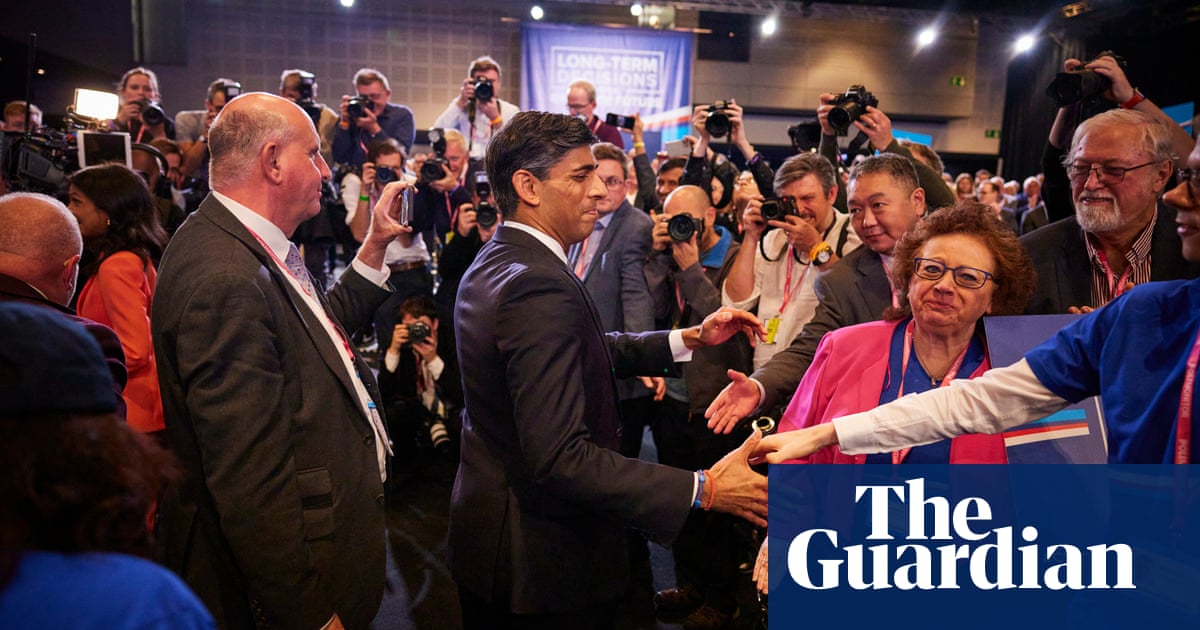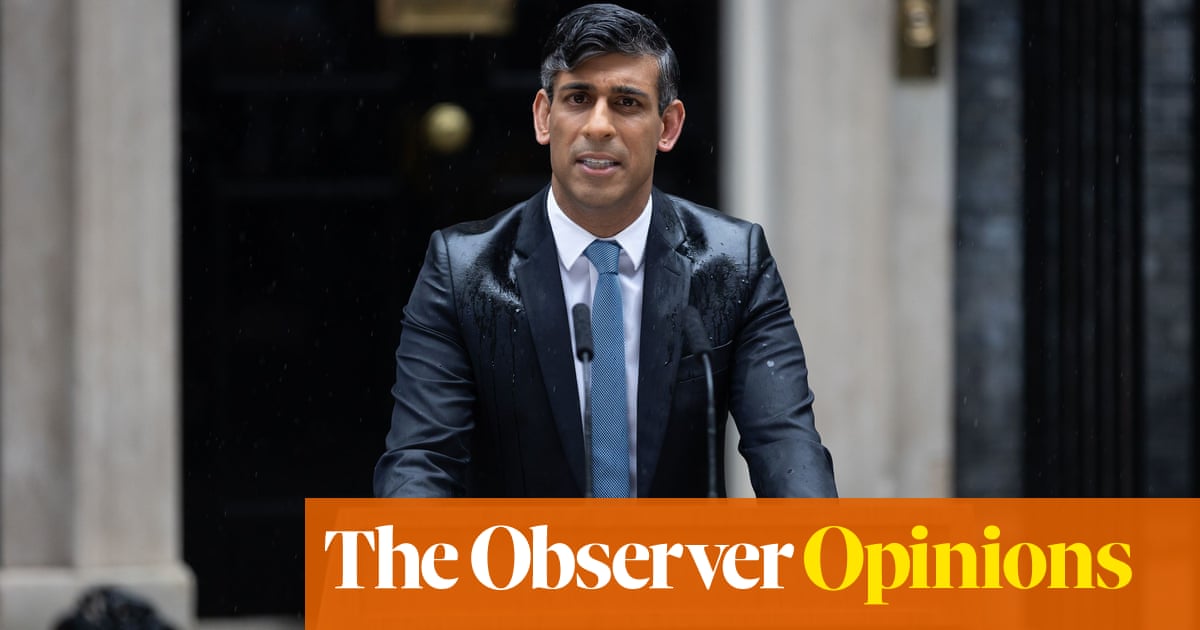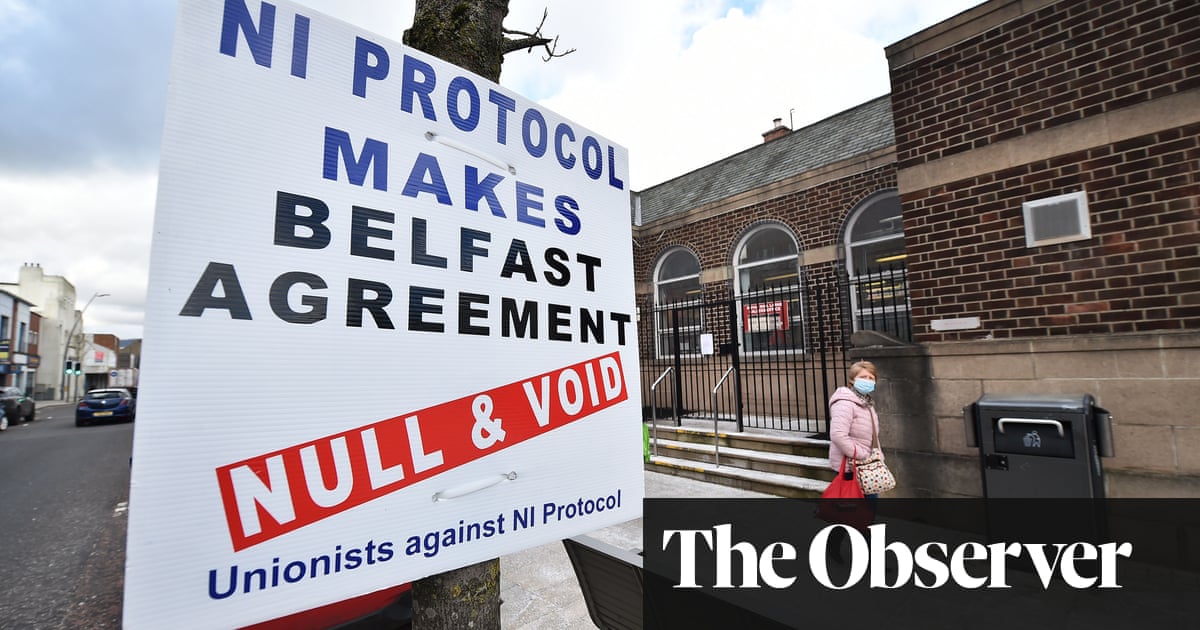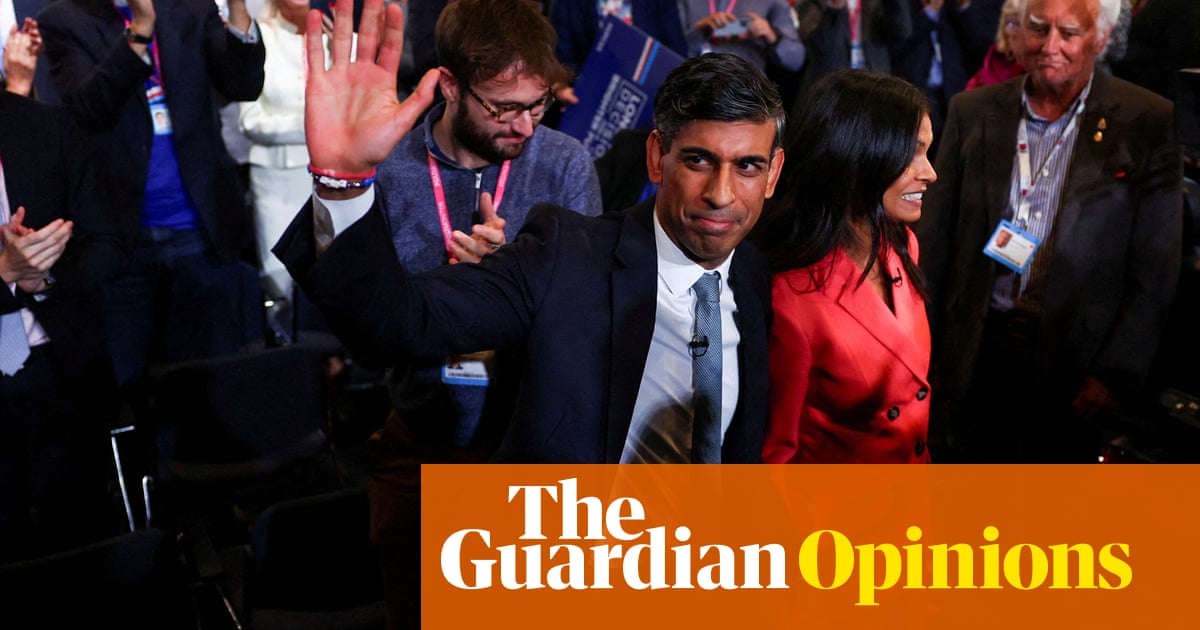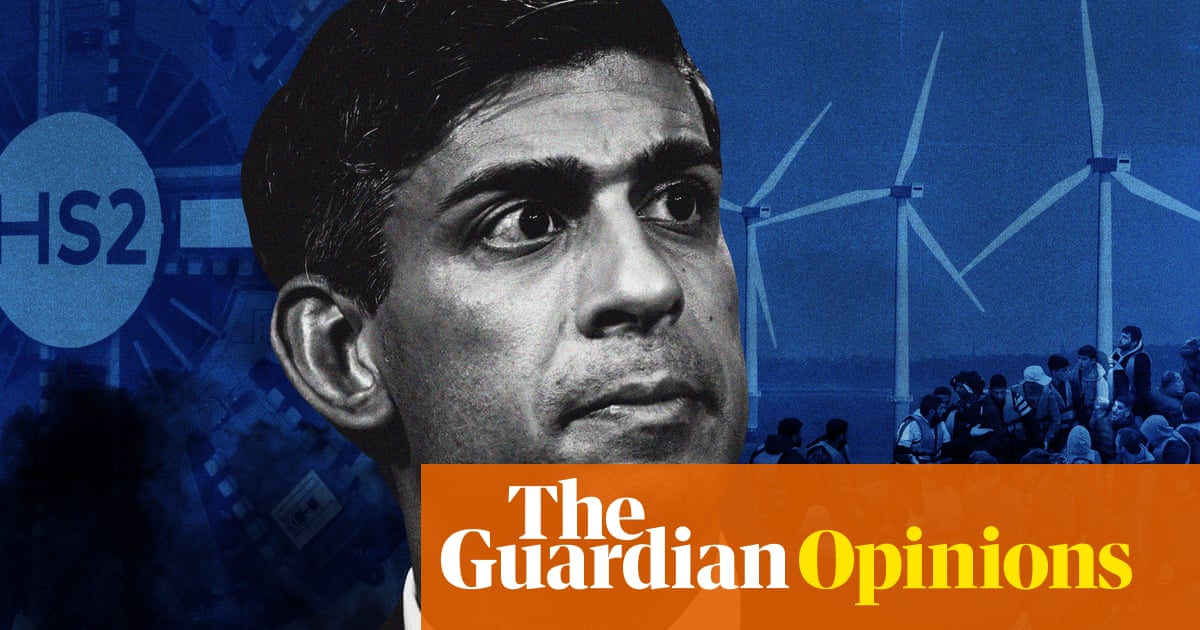
Frances Ryan Sunak is going down, and he’s happy to drag the whole country with him
When Akshata Murty made a surprise introduction for her “fun and compassionate” husband before his first – and probably last – conference speech as leader, the tribute sounded a little like a bizarre obituary. If party members were watching the prime minister’s slow political death, it was the rest of us who were begging to be put out of our misery.
Sure, there were a few policy announcements: HS2’s Manchester leg scrapped in place of a “network north”, a “long-term workforce plan” for the NHS, and raising the legal smoking age. But this was a speech with remarkably little substance. The cost of living? Public services? Sunak spent more time talking about vapes than poverty. Families struggling to pay the bills won’t find much help in an announcement of more maths lessons at school.
“You either think this country needs to change or you don’t,” he said. This was a series of complaints about the state of Britain untroubled by the small fact that his party has been in charge for 13 years. Sunak is effectively the hot-dog guy meme, trashing the country only to announce: “We’re all trying to find the guy who did this!”
Everyone else was to blame – striking doctors, “vested interests”, even Jeremy Corbyn. With no answers to the problems facing the country, he resorted to dog-whistles: people deemed unfit to work are effectively faking it; men are pretending to be women. “The UK is not a racist country,” Sunak declared, 24 hours after the home secretary described a “hurricane” of migrants to come.
No scapegoat is too vulnerable. No post-truth fearmongering is too heinous. For Britain, the consequences are clear: crumbling public services, growing poverty and a toxic political culture. Sunak is going down, and he’s happy to drag the whole country with him.
Frances Ryan is a Guardian columnist
Katy Balls There is a high-risk electoral strategy at play here
Liz Truss once said that she was willing to be unpopular if that’s what it took to enact her economic policies (although even she probably didn’t expect the backlash that soon followed). In his first conference speech as Tory leader, Rishi Sunak has suggested that he is also happy to divide opinion – and his own party – if that’s what it takes to action his plans.
The three main announcements – axing the Manchester leg of HS2, a phased ban on smoking and scrapping A-levels for a new broader qualification – all come with risks. The West Midlands mayor, Andy Street, has made clear his displeasure over cutting high-speed rail, alongside many Tory big beasts. The education announcement could face a backlash from parents who worry about change. And the smoking ban will prove more unpopular with the Tory party faithful than the public at large.
So, why is Sunak doing this? After all, the education policy will only come to pass if he somehow wins the next election. Effectively the calculation has been made in Downing Street that, given the stubborn polls, Sunak doesn’t have much to lose – his managerialist approach up to this point hasn’t seen much reward. Therefore it’s time to “let Rishi be Rishi” – and see what happens.
If it goes to plan, Sunak will come across as the change candidate – a politician of action who voters can see stands for something, even if they don’t like what it is. They want to contrast this with Keir Starmer, on the calculation that Labour will run a cautious election campaign. Combine that with Starmer’s U-turns over the years and, Sunak supporters argue, he could look the more authentic choice.
But, ultimately, appearing the change candidate after 13 years of Tory rule is very hard to do. This is the first taste of how Sunak will try to do it.
Katy Balls is the Spectator’s political editor
Simon Jenkins At least he spoke sense on HS2
The white elephant HS2 has lost a second leg, with Rishi Sunak confirming in today’s speech that he is cutting the Manchester line. But in going, it has given Sunak a terrible beating. He has long known he would have to cut back on its intolerable costs. How many billions might he have saved – and spent elsewhere – had he done so when it crossed his desk two years ago? Now his poor media management has allowed it to scar his party conference. Yet he has still failed to take the obvious final step, to cancel what now really is the most half-baked infrastructure project in Europe. Sunak’s eloquent arguments against the northern HS2 – and the rich rewards from cancelling it – are now applicable no less plausibly against the southern one.
Sunak was wise to boast new uses for the £36bn he intends to save on the Manchester leg. All are wiser investments than HS2. That they have had to wait until today shows how chaotic are central government’s sense of priorities when it comes to these vanity projects. Nuclear power stations may be next on the list. As it is, to get a handful of extra trains to Birmingham at a cost of some £70bn will still require taxpayers to spend three times more than they intend to spend in total on new hospitals in England. It far exceeds what the government has deemed necessary for extra spend on English schools. That is the reality behind this week’s hysteria of rhetoric and metaphor.
What remains of HS2 is a political monstrosity. There is a perfectly adequate railway from London to Birmingham. HS2 will still drain rail investment from the network. It will still not link to HS1. But the baton for all this may soon pass to Keir Starmer. He should note the one lesson Sunak has taught him: it is never too late to cancel HS2. If Starmer wishes to be seen as a responsible custodian of public money, he should say now that he will cancel this fiasco. He should certainly not wait for a Labour party conference in Liverpool.
Simon Jenkins is a Guardian columnist
Lester Holloway Sunak’s comments on race were deeply misguided
“Never let anyone tell you this is a racist country: it is not,” Sunak declared. The only evidence he offered was himself – privately educated and the richest MP in Britain – and other Black and Asian Tory ministers. His words echoed that of trade minister Kemi Badenoch, who boasted this week that Britain is the “best place to grow up Black”. Meanwhile, the home secretary, Suella Braverman, stirs up fears of a “hurricane” of migration about to land in Britain.
It is highly reductive to entirely base an assessment of whether Britain is racist on the success of a handful of Tory MPs. All the evidence points the other way. Black people are twice as likely to be unemployed, and four times more likely to suffer maternal deaths. Last week, a poll by the Voice newspaper and Cambridge University found under half were in any way proud to be British, and many did not see Britain as their permanent home.
This is the consequence of living in a systemically racist society. Of course, there was nothing in Sunak’s speech to tackle the root causes. He and his party prefer to live the lie of there not really being a problem in the first place, as the Sewell report tried to claim. The problem, as they see it, is people choosing to resent Britain rather than getting on with life.
When Sunak boasted of Britain being “the most successful multi-ethnic democracy” on Earth, he was doing nothing but virtue signalling. Playing up his own family story while dismissing the experiences of others is for Tory consumption only, because they have long given up on most Black and brown votes. But the damage such narratives can do to the national conversation on racism between now and the election could be profound.
Lester Holloway is the editor of the Voice
Sam Hall From a Conservative environmentalist perspective: mixed feelings
It’s hard to think of a policy issue where “long-term decision-making” is more important than our stewardship of the natural world. It is hard to think of a “brighter future” than one with clean growth and the restoration of nature at its core. So it was good to hear the prime minister underscore his commitment to the environment.
He reiterated the arguments from his recent speech on net zero. We do need to minimise the costs for households and preserve the consent of the public. The UK does have a world-leading record on emissions reduction. Too few people realise the UK is halfway to net zero. But while not much has changed in policy terms on net zero, concerns about the government’s narrative were voiced across the fringe of the party conference. Past success at decarbonisation should not be a reason for complacency. We should be reaping the economic benefits from our head start by developing and exporting the technologies of the future, not letting other countries overtake us. Nor can it be politically prudent to validate arguments against the previous net zero strategy, which is not substantively different from Sunak’s new approach.
The speech didn’t include many new green policies. Environmentalists will have mixed feelings about the scaling back of HS2. It has caused local environmental damage, particularly to ancient woodland, but it would also have offered a low-carbon option for longer journeys. The improvements to regional rail networks announced in its place could be transformational for the economy as well as transport sustainability. However, the rapid inflation in the HS2 budget has revealed the sky-high costs of building transport infrastructure in the UK. This underlying problem will need to be tackled if we’re to reach net zero affordably.
The prime minister still has more to do to demonstrate how the UK will meet our climate targets through carrots rather than sticks. As we approach the next election, this could give the Conservatives a more positive narrative on the environment.
Sam Hall is the director of the Conservative Environment Network
Larry Elliott It’s the economy, Rishi
Rishi Sunak has junked the technocratic, nerdy approach that has been the hallmark of his first year in office and replaced it with something more radical, and a lot more risky. After 13 years in power it is quite courageous – or foolhardy – to say that you are the agent of change. Normally it is opposition leaders who say that.
But needs must. The Conservatives are lagging miles behind in the opinion polls and Keir Starmer has thus far adopted a safety-first approach. So, appealing to the public as if you were the leader of the opposition is perhaps the least bad option in the circumstances.
There were three big policy announcements – on HS2, smoking and education – to drive home the message that the Conservatives can deliver the change the country so badly wants and needs. And, make no mistake, Sunak has put pressure on Labour to come up with some eye-catching policies of its own when it meets in Liverpool next week.
Even so, the prime minister’s strategy has its problems. Voters may take some convincing that the £36bn of savings from HS2 will actually be recycled into other infrastructure projects. After all, if a government is prepared to axe such a high-profile scheme, it could easily do the same in the future to less politically sensitive pieces of infrastructure.
An even bigger issue is the state of the economy. As Sunak spoke, interest rates on government debt rose to their highest since the late 1990s, on fears that the Bank of England will need to keep official borrowing costs at their current level well into next year.
Although the economic outlook is less bleak than it was after Liz Truss’s ill-starred premiership, it is still poor. The economy may just avoid recession this winter, and living standards should start to rise gently as wage growth outpaces price increases. But there will certainly be no feel-good factor and nor is there scope for pre-election tax cuts. The government has run out of money, and it is rapidly running out of time.
Larry Elliott is the Guardian’s economics editor




